-
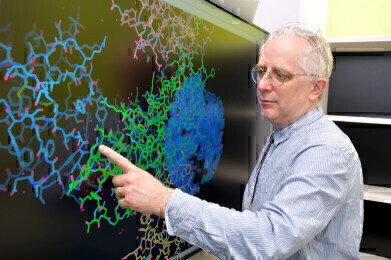 Jim Naismith (Credit Roaslind Franklin Institute
Jim Naismith (Credit Roaslind Franklin Institute -
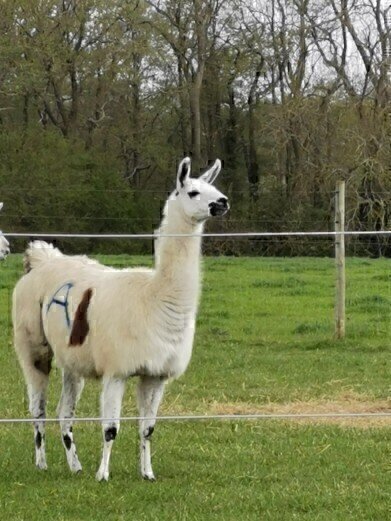 Fifi (Credit: University of Reading)
Fifi (Credit: University of Reading) -
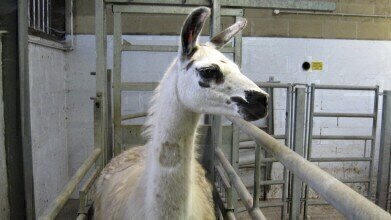 FiFi (Credit University of Reading
FiFi (Credit University of Reading -
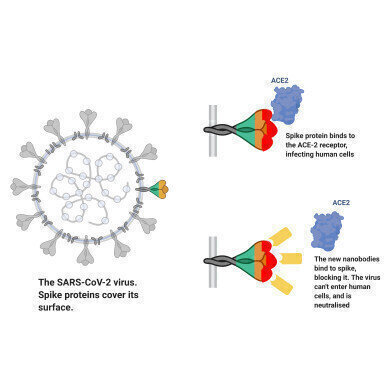 Credit Rosalind Franklin Institute
Credit Rosalind Franklin Institute -
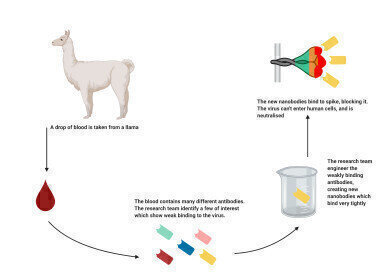 Credit Rosalind Franklin Institute
Credit Rosalind Franklin Institute
News & Views
Could Llama Antibodies Provide a Global Resource for Covid-19 treatment?
Oct 14 2021
“These are among the most effective SARS-CoV-2 neutralising agents we have ever tested at PHE. We believe the unique structure and strength of the nanobodies contribute to their significant potential for both the prevention and treatment of COVID-19 and look forward to working collaboratively to progress this work into clinical studies.” Miles Carroll
Research led by scientists at the Rosalind Franklin Institute is leading to the possible development of a nasal spray to protect against Covid-19 using a type of tiny antibody generated by llamas and camels that binds tightly to the virus.
They found that short chains of the molecules, which can be produced in large quantities in the laboratory, could offer an alternative to the use of human antibodies taken from patients who have recovered from Covid-19 and which need to be injected into the recipient.
“Nanobodies have a number of advantages over human antibodies,” said Professor Ray Owens, head of protein production at the Rosalind Franklin Institute and lead author of the research. “They are cheaper to produce and can be delivered directly to the airways through a nebuliser or nasal spray, so can be self-administered at home rather than needing an injection. This could have benefits in terms of ease of use by patients but it also gets the treatment directly to the site of infection in the respiratory tract.”
Binding ability increased
After researchers at the University of Reading raised antibodies in a llama called Fifi, a small blood sample was collected from which they were able to purify four nanobodies capable of binding to the Covid-19 virus. The nanobodies were then combined together into chains of three to increase their ability to bind to the virus and then produced in cells in the laboratory.
Fifi was reported as having no ill-effects such as sickness during the procedure.
The team found three nanobody chains were able to neutralise both the original variants of the Covid-19 virus and the Alpha variant that was first identified in Kent, UK. A fourth nanobody chain was able to neutralise the Beta variant first identified in South Africa.
“Because we can see every atom of the nanobody bound to the spike, we understand what makes these agents so special,” said Professor James Naismith, Director of the Rosalind Franklin Institute, who helped lead the research. “While vaccines have proven extraordinarily successful, not everyone responds to vaccination and immunity can wane in individuals at different times.”
“Having medications that can treat the virus is still going to be very important, particularly as not all of the world is being vaccinated at the same speed and there remains a risk of new variants capable of bypassing vaccine immunity emerging.” If successful and approved, nanobodies could provide an important treatment around the world, being easier to produce than human antibodies and which don’t need to be stored in cold storage facilities, added Professor Naismith.
Funding needed to progress further
The research team, which included scientists at the University of Liverpool, University of Oxford and Public Health England, now hope to obtain funding so they can conduct further research needed to prepare for clinical studies in humans.
Prof Miles Carroll, Deputy Director of the National Infection Service, Public Health England (PHE), said: “Although this research is still at an early stage, it opens up significant possibilities for the use of effective nanobody treatments for COVID-19.
“These are among the most effective SARS-CoV-2 neutralising agents we have ever tested at PHE. We believe the unique structure and strength of the nanobodies contribute to their significant potential for both the prevention and treatment of COVID-19 and look forward to working collaboratively to progress this work into clinical studies.”
Dr Andrew Bourne, Director of Partnerships at EPSRC, said: “Utilising the unique properties of llamas’ nanobodies, this research could lead to an important new form of treatment for Covid-19 that is cheaper to produce and easier to administer.
“It is a vivid illustration of the impact that long-term discovery research at the cutting edge of physical and life sciences, as undertaken at the Rosalind Franklin Institute, can have.”
Professor James Stewart, co-author and professor of molecular virology at the University of Liverpool said: “The pre-clinical trials of the nanobodies in hamsters are extremely encouraging and suggest that they may be effective at treating COVID-19 disease as well as help prevent infection. Having therapies such as this will be important for populations that are either unvaccinated or where vaccination is inappropriate or ineffective.”
The researchers, who were funded by the UK Research and Innovation’s Medical Research Council and the Engineering and Physical Sciences Research Council, The EPA Cephalosporin Fund and Wellcome, also hope the nanobody technology they have developed could form a so-called ‘platform technology’ that can be rapidly adapted to fight other diseases.
“When a new virus emerges in the future, the generic technology we have developed could respond to that, which would be important in terms of producing new treatments as quickly as possible,” said Professor Owens.
The findings were published in Nature Communication
More information online
Digital Edition
ILM 49.5 July
July 2024
Chromatography Articles - Understanding PFAS: Analysis and Implications Mass Spectrometry & Spectroscopy Articles - MS detection of Alzheimer’s blood-based biomarkers LIMS - Essent...
View all digital editions
Events
Jul 28 2024 San Diego, CA USA
Jul 30 2024 Jakarta, Indonesia
Jul 31 2024 Chengdu, China
ACS National Meeting - Fall 2024
Aug 18 2024 Denver, CO, USA
Aug 25 2024 Copenhagen, Denmark

.jpg)

24_06.jpg)













